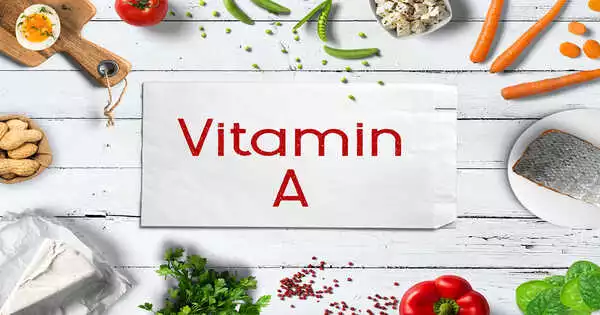Vitamin A is a fat-soluble vitamin that plays an important role in various bodily functions, including vision, immune system function, and cell growth and differentiation. It exists in two main forms: retinoids, which are found in animal-based foods such as liver, dairy products, and fish, and carotenoids, which are found in plant-based foods such as carrots, sweet potatoes, and leafy green vegetables.
Vitamin A also promotes the production and activity of white blood cells, aids in bone remodeling, promotes the health of endothelial cells (those that line the body’s interior surfaces), and regulates cell growth and division, which is required for reproduction.
Preformed vitamin A (retinol, retinyl esters) and provitamin A carotenoids such as beta-carotene that are converted to retinol are the two main forms of vitamin A in the human diet. Animal products, fortified foods, and vitamin supplements contain preformed vitamin A. Carotenoids are naturally found in plant foods. Lycopene, lutein, and zeaxanthin are examples of carotenoids found in food that are not converted to vitamin A but have health-promoting properties.
Importance
The primary role of vitamin A is in promoting healthy vision. It is essential for the proper functioning of the retina, the part of the eye responsible for detecting light and transmitting visual information to the brain. Vitamin A also helps to maintain healthy skin, teeth, and bones.
In addition to its role in vision and growth, vitamin A is also important for immune system function. It helps to maintain the integrity of the epithelial tissues that line the respiratory, digestive, and urinary tracts, which act as barriers to infection.
Sources of Food
Retinol is added to many breakfast cereals, juices, dairy products, and other foods (preformed vitamin A). Beta-carotene, lycopene, lutein, and zeaxanthin are found in many fruits and vegetables as well as some supplements.
Vegetables with leafy greens (kale, spinach, broccoli), orange and yellow hues (carrots, sweet potatoes, pumpkin and other winter squash, summer squash)
- Tomatoes
- Red bell pepper
- Cantaloupe, mango
- Beef liver
- Fish oils
- Milk
- Eggs
- Fortified foods
Vitamin A deficiency
Vitamin A deficiency is a common problem in many developing countries, and can lead to a variety of health problems including blindness, immune system dysfunction, and even death. However, excessive intake of vitamin A can also be harmful, particularly in the form of retinoids. Therefore, it is important to maintain a balanced and varied diet that provides adequate but not excessive amounts of vitamin A.
















